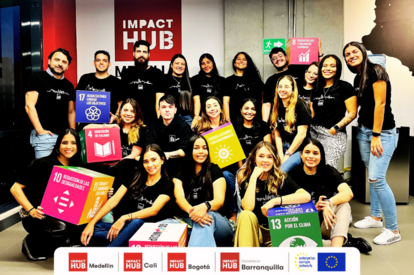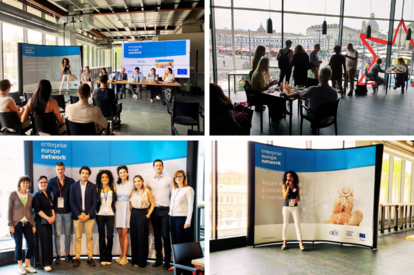
Enterprise Europe Network is a key supporter of small and medium-sized businesses (SMEs) in Europe’s cultural and creative industries (CCIs). In this interview with Aija Konisevska Azadi, Project Manager at the North Denmark EU Office, we delve into entrepreneurship in these sectors and explore how the Network helps small businesses succeed in a competitive market.
Why are CCIs important for European economies and societies?
CCIs are a big part of Europe’s economy, including diverse fields like architecture, museums, video games, music, and literature. They make up about 3.95% of the EU’s added value and employ around 8 million people. Over 99.9% of the businesses in the sector are SMEs, totalling approximately 1.2 million firms.
Beyond their economic impact, CCIs are catalysts for innovation and creativity across industries. For instance, architects collaborate with virtual artists to create immersive city models, transforming how urban spaces are designed and visualised. Advertising agencies draw on narrative techniques from films and literature to craft compelling brand stories. The gaming industry's advancements in user interface design, interactive storytelling, and graphics have influenced user experience design in sectors from education to healthcare.
CCIs also wield profound social influence, fostering community cohesion through cultural events and educational programs. They contribute to urban revitalisation by establishing creative hubs that attract both residents and businesses. Additionally, CCIs promote social inclusion by providing platforms for artists and creatives from diverse backgrounds. Most significantly, CCIs contribute to a common sense of European identity and values through shared cultural experiences, be it through movies, video games, or music.
What can you tell us about CCIs in Denmark?
Denmark has a lively cultural scene with a rich heritage, covering design, film, TV series, gaming, fashion, and architecture. Each city brings something unique to the table. Copenhagen attracts cultural tourists, Odense enchants Hans Christian Andersen enthusiasts, and Aalborg stands out for its excellence in sports. The creative industries in Denmark are major players in the economy, generating about DKK 277 billion in turnover, with an impressive DKK 131 billion in exports. These numbers show the sector’s strong growth and its importance nationally and globally.
What are the main challenges faced by SMEs in the CCIs?
Small companies in CCIs face unique challenges that affect their growth and sustainability. Limited finances make it hard to fund projects and grow. Many SMEs in CCIs are unaware about available opportunities or face tough competition for funding. Finding and keeping skilled talent is another persistent obstacle. A big part of the staff is self-employed or has part-time work, which leads to job insecurity and fewer chances for skill improvement. Protecting intellectual property is complex, with businesses facing the risk of unauthorised use or replication of their work.
The COVID-19 pandemic made things tougher for CCIs. Closing physical spaces, like theatres and art galleries, caused revenue loss and financial stress. The transition to digital platforms forced small businesses to adapt to online formats, which required technical expertise and financial investment. The green transition added the need for environmentally sustainable practices. Coping with all these changes demands resilience, adaptability, and sharp business skills from CCIs.
What is the role of Enterprise Europe Network, particularly the North Denmark EU Office, in supporting cultural and creative industries?
The Enterprise Europe Network serves as a bridge, connecting entrepreneurs to key resources and opportunities. It gives insights into industry trends, EU policies, and upcoming events. The Network helps SMEs find manufacturers and collaborators, organise business missions, and access funding. It also assists entrepreneurs in understanding market dynamics, navigating EU regulations, and protecting their intellectual property rights.
The North Denmark EU Office plays an important role in supporting small businesses in CCIs. We have helped businesses embrace green practices and technologies, use digital tools, learn new skills, and recover after the pandemic.
Can you give examples of how the Network has helped businesses in the cultural and creative sectors?
Many startups have thrived thanks to the Network’s support, whether by obtaining funding or discovering new business collaborators. Take Limfjordsteatret, a local theatre, for example. Faced with major challenges after the pandemic, they sought to shift to a digitalised and sustainable business model. The Enterprise Europe Network stepped in, helping them partner with Kyber Teatro in Italy. This collaboration resulted in a €60,000 Erasmus+ grant to explore the use of performing arts for educational purposes, such as science theatre plays.
Cinematronic, a start-up founded in 2021, created an interactive adaptive media system using biosensors, which tailors content to viewers’ emotions. With backing from the North Denmark EU Office, they put together a successful fundraising strategy, concluded a partnership with BrainSigns in Italy, and obtained a €400,000 Erasmus+ grant. This helped the company triple its turnover and grow to six employees. Additionally, a short film using Cinematronic’s digital solution won first place at the Cannes Film Festival in 2023.
The Danish Ensembles, Orchestras, and Opera Institutions developed DEOO Charanga, a free digital platform for music education. Through the Enterprise Europe Network, they joined the EU programme Creative Europe, securing a € 1.7 million grant for the Fortissimo project alongside 23 partners.
Sonokids DK partnered with Steincke Soundlab to develop SeniorForm, a free exercise programme for seniors in nursing homes. With support from the North Denmark EU Office, they won a €60,000 Erasmus+ grant, expanding the digital platform’s accessibility to seniors throughout Europe.
The Aalborg Gymnastics Association received €25,000 under the Erasmus+ Mobility of Sport Staff. With guidance from the Network, the association tackled challenges like declining gymnast numbers and higher dropout rates among girls aged 12-13. They also prioritised inclusivity by offering classes for young people with physical disabilities. And these are just a few examples.
What emerging trends do you see shaping the future of SMEs in the CCIs, and how can businesses prepare for these changes?
CCIs are changing fast, and entrepreneurs in the sector need to be flexible and quick to adapt to shifting trends, customer preferences, and industry dynamics.
First, there’s a rising emphasis on sustainability. SMEs should include eco-friendly practices in their operations. This includes minimising waste, adopting renewable energy sources, and implementing responsible sourcing practices. It’s essential for businesses in the CCIs to communicate their commitment to sustainability transparently to both customers and stakeholders. This can involve showcasing specific initiatives like the use of recycled materials and support for ethical labour practices. This proactive approach not only aligns with the growing consumer demand for eco-conscious products but also positions businesses as leaders in responsible entrepreneurship within the CCIs.
Second, people crave personalised experiences. Businesses that grasp and cater to their audience’s preferences, whether through custom-designed artwork, unique experiences, or niche cultural events, stand out. Using technology for personalisation and investing in market research is essential. For example, platforms like Spotify and Netflix use machine learning to personalise experiences by analysing behaviour for music and content recommendations. Similarly, video games companies conduct research on player demographics to create personalised gaming experiences, such as adaptive difficulty levels.
Third, as data analytics and artificial intelligence get better, SMEs in CCIs should use data to understand what their audiences need. By doing so, they can craft customised content and enhance their business strategies. For example, museums look at data to curate exhibitions that people will enjoy. Online art marketplaces like Saatchi Art or Artsy use data analytics to grasp buyer preferences, enabling artists to fine-tune their portfolios. Apps in the cultural tourism sector like Airbnb Experiences use AI to refine their offerings based what users liked before and how they travel.
What advice would you give to start-ups with international ambitions in the CCIs?
Entrepreneurs in this sector can broaden their reach and enhance user experiences through digital innovation. The integration of virtual and augmented reality changes how audiences engage with cultural and creative content. For example, art galleries can offer virtual tours or interactive AR exhibits for immersive experiences.
Sustainability is equally vital. A furniture design studio can adopt eco-friendly practices, such as using recycled materials or sourcing wood from certified sustainable forests. This not only appeals to eco-conscious consumers but also benefits the environment. Long-term sustainability involves designing a business model that can adapt to unforeseen challenges, like supply chain disruptions. For instance, a fashion brand could operate both online and offline to increase resilience against market fluctuations.
Another key piece of advice is to build relationships with other businesses – small, big, or from different industries. Networking opens doors to collaborations, business insights, and partnerships. Industry matchmaking events and social media are great places to start. Think beyond local markets; explore international opportunities as well.
Finally, invest in your team for long-term success in creative businesses. Have regular trainings to keep employees updated on the latest industry trends and technologies. Offer professional development opportunities, such as conferences or workshops, to keep the team inspired and connected. Remember that encouraging continuous learning also boosts employee motivation and satisfaction.
Entrepreneurship is never easy, but seeking support from Enterprise Europe Network can make the journey more manageable and fun. Think of it as an extension of your team, with experts in your specific area of interest – whether that’s digitalisation, innovation, sustainability, or internationalisation. Best of all, it’s entirely free. Find your local contact point and get started today.
Aija Konisevska Azadi is a Project Manager at the North Denmark EU Office, which has been part of the Enterprise Europe Network since 2008. Aija has co-chaired the Network’s group of experts in tourism since 2018 and is a member of the group of experts in culture and creative industries.
This article was co-written by Ruxandra-Laura Bosilca, PhD, Social Media and Community Manager at EISMEA.
Related articles

Colombia is quickly becoming a go-to destination for entrepreneurs, thanks to its prime location, booming economy, and talented workforce. Ready to dive in? Here are 5 must-know tips from our local...

Embedding sustainability into your daily business operations is not only beneficial for the environment, but can also improve your brand reputation, reduce costs, and attract socially conscious...

Planning to take your business to new international shores? It’s a thrilling journey, but the path can be rocky. In this blog, we’ll share 5 key tips for success and show you how Enterprise Europe...

Intellectual property is a powerful tool that can help small and medium-sized enterprises (SMEs) thrive in a fierce business world. Small businesses drive innovation, job creation, and economic growth...
